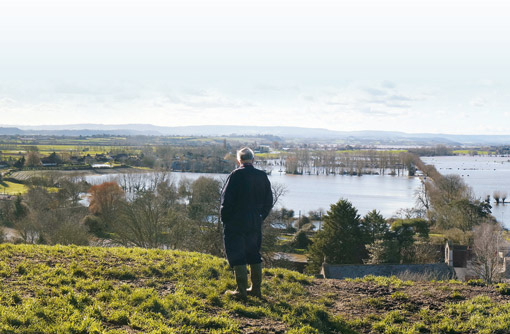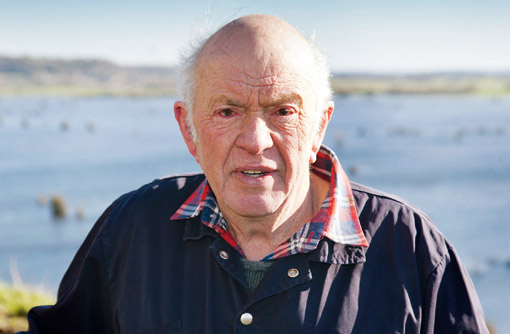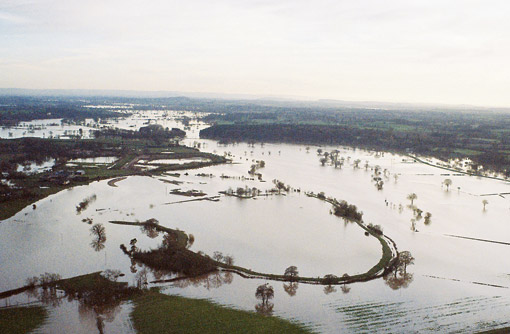Lives lost unless flooding risk cut, says farmer

Flooding is devastating many farm businesses across the country. But if the Environment Agency took a fresh approach to flood management it could alleviate many of the problems. Farmers Weekly reportsFlooding is devastating many farm businesses across the country. But if the Environment Agency took a fresh approach to flood management it could alleviate many of the problems. Farmers Weekly reports
‘Less talk more action needed’

Lives and livelihoods will be lost unless the Environment Agency takes rapid action to reduce the risk of flooding on farmland, according to a Somerset farmer.
Extensive flooding has devastated farmland on Curry Moor and North Moor for months.
Some farmers have been forced to sell livestock to ease pressure on dwindling forage stocks, while others have had to erect makeshift moats to protect their farms.
Dairy producer Barrie Bryer voiced strong concerns over the “traumatic effect” the flooding was having on the local community and said steps had to be taken to dredge the River Parrett.
“There are lives at risk because people are losing their livelihoods. I am convinced it will lead to farmers taking their lives,” he said.
Mr Bryer, who farms 100 Friesians at Charity Farm, Bere Aller, said comments made by secretary of state Owen Paterson at an NFU meeting in Tiverton on 25 January could be the tipping point for some.
“The secretary of state said the priority was protecting life and limb rather than farmland. But I am in no doubt there are so many people under stress that some will take their own lives,” he said.
A meeting between the Somerset Consortium of Drainage Boards and the Environment Agency (EA) on 30 January recognised that “dredging a section of the lower rivers Tone and Parrett could bring the greatest practical benefits of reducing the depth and duration of flooding.
“Unfortunately initial calculations show that normal national funding criteria are not met by the first cost-benefit analysis of the desilting.”
However, it was agreed to review the benefits calculations with the view to seeking “special case” funding to undertake dredging later in the year.
But, Mr Bryer said there needed to be less talk and more action. “We’ve heard over the past 20 years that something’s going to be done. There needs to be a greater desire to do it,” he said.
He warned inaction could result in locals taking things into their own hands. “If the EA does nothing, there could be an uprising.”
“I’ve had to sell 12 cows to ease pressure on forage stocks, but there are farmers that are worse off. I know one who’s got 900 acres under water and has had to build a moat around his farm. Another has had to sell 70 beef animals as he’s running out of forage.”
Call for better maintenance

The aerial photograph (above) of farmland in Worcestershire shows the devastating impact of the flooding on arable grower Stephen Watkins’ farm.
Taken by Mr Watkins during a helicopter flight above his arable farm in late November, the image shows 30ha of stubble turnips and swedes, as well as 28ha of wheat under water.
By December, the situation was even worse with 242ha – more than half Sheepcote Farm’s total acreage of 440ha – under water at Severn Stoke, near Worcester.
Since November, about 14ha of farmland has been so flooded that Mr Watkins has been unable to see it.
The farm, which is situated on a flood plain, has flooded four times in the past four months. Although the floodwaters have receded twice, this week they were almost back to the same levels as November.

Flood defences against the River Severn are supposed to protect his farmland seven out of every 10 years – but floodwaters have breached the defences twice in the past two months.
“We’ve got about 200ha under water.
“We drilled about one-third of the winter wheat we expected to drill – and we have lost about one-third of that due to flooding,” said Mr Watkins.
When the floodwaters recede, he is left to clear up the mess, costing him several thousands of pounds at a time.
“I’m fed up having to pick up the cost of clearing my farm each time my farm floods when the Environment Agency used to pick up the bill,” said Mr Watkins.
“The agency has told me that they are going to do nothing about the flood rubbish, which includes plastic and glass bottles, tin cans, fire extinguishers and even motorbike helmets.
“I end up getting the team in from the local school as a fundraising exercise to help clean up.”
The additional £120m the government has allocated for spending on capital flood defences would be better spent maintaining existing flood defences, he reckoned.
“£120m on flood defences is a great headline grabber for people who live in towns.
“But the Environment Agency said it will cut back its maintenance budget for defence projects by £49m by 2015,” he said.
“The flood defences we have are collapsing.
“Why are we planning on building more of them when we cannot maintain what we’ve already got?”
Water damage is the ‘worst ever’

Guy Poskitt, 2012 Farmers Weekly Farmer of the Year, described the flooding in his area of East Yorkshire as the worst he has seen.
The vegetable grower, who supplies carrots, parsnips and swede to Asda, has had to buy produce from the Continent to meet his contract as flooding has caused extensive crop failure on 2,400ha at Kellington near Doncaster.
He has lost £53,000 worth of crop, including 4ha of sugar beet, 4ha of carrots, 8ha of wheat and poor establishment of wheat on a further 40ha.
“This was premium land but had become high risk now,” he said. “If the situation doesn’t improve, it will become uncroppable.”
In one area, Mr Poskitt had stopped growing potatoes because of the regular flooding.
“I daren’t put potatoes in here now because there’s a one-in-one chance of flooding. If potatoes are under water for just 24 hours, they’ve had it,” he said.
The main problem has been continuous heavy rainfall coupled with a lack of dredging of the river Aire. Urbanisation in nearby Leeds and Huddersfield had also made the situation worse because it had led to an increase in the release of run-off water into the countryside, Mr Poskitt believed.
The river Aire has overflowed at least five times in the past 12 months – it used to flood once every five to 10 years. Many fields are continuously under water and are almost inaccessible to vehicles.
Mr Poskitt blamed the EA for not doing enough to maintain watercourses and wants farmers to have more control of drainage locally.
Huge soil deposits are piling up in certain areas by the River Aire and he is worried the banks are being undermined by vermin, which will cause them to break.
“The river has not been cleaned out for years,” he said. “One day the bank will blow a hole in it and it will flood straight into the village.”
While flood control is managed at a national level, it is never going to get sorted out, he said.
“We need to give more local control and make it a local project because people understand problems in their own areas.
“It’s a disgrace that there’s extra spend on capital but reduced spend on maintenance. Let’s concentrate on getting the bits we already have working right, before looking at getting any more to maintain,” he said.
See our interactive weather map charting last year’s variable conditions
